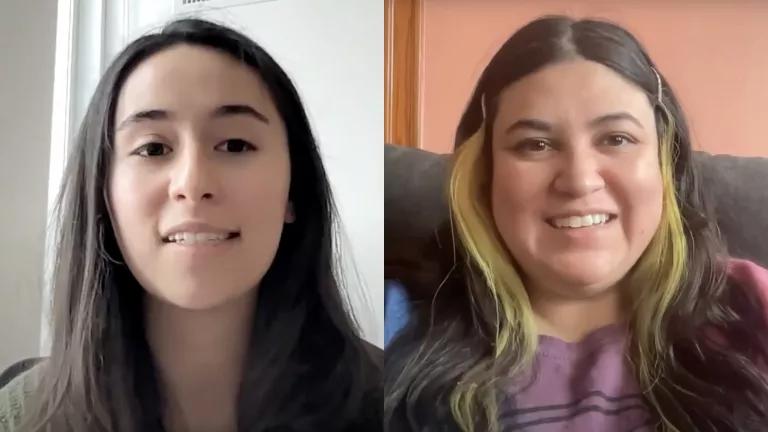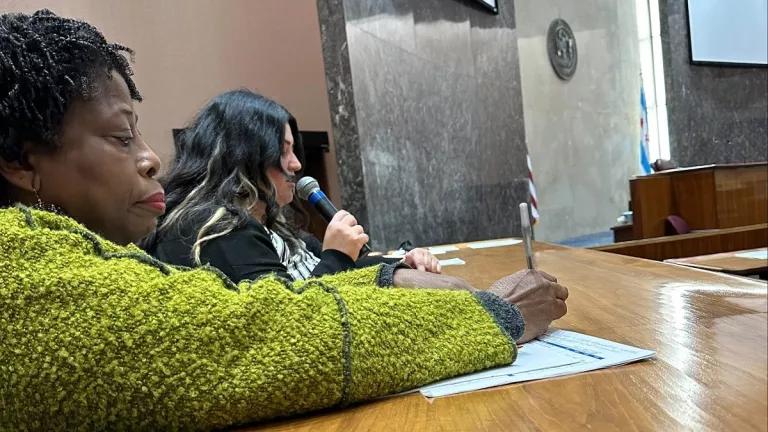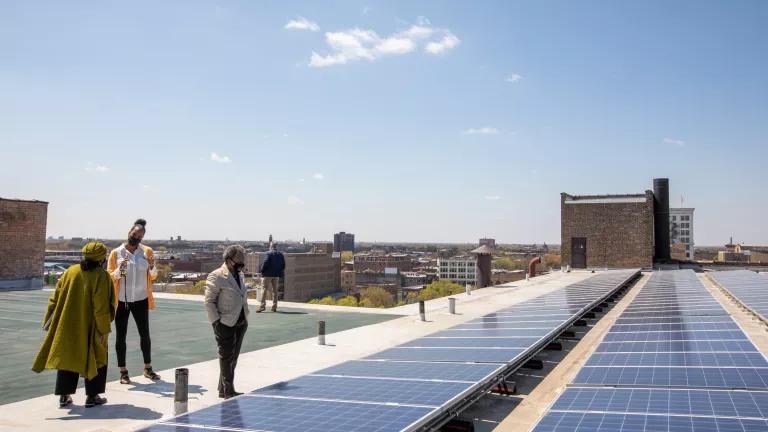Toward a Just Transition in Peoria
As the E.D. Edwards plant closes, let’s celebrate the amazing work that Peoria-area groups have been doing.

A home with new windows from METEC.
This is the eighth in a series of blogs celebrating the grant projects funded through our Clean Air Act settlement with the owners of the E.D. Edwards coal-fired power plant outside Peoria, Illinois.
As the E.D. Edwards plant approaches its settlement-mandated closure deadline of December 31, 2022, let’s celebrate the amazing work that Peoria-area groups have been doing to help local residents recover from the plant’s harmful air pollution and transition to a cleaner energy future.
This blog provides brief progress updates on each of the grant projects launched in 2020, using funding from NRDC’s, Sierra Club’s, and Respiratory Health Association’s 2019 settlement with the plant’s owner. The Central Illinois Healthy Community Alliance, NAACP Peoria, and Illinois People’s Action helped advise the plaintiffs on their funding decisions, and the Environmental Law and Policy Center provided counsel to Respiratory Health Association.
Energy efficiency projects
The Edwards Settlement is funding over $1.6 million in energy efficiency retrofits and pre-requisite upgrades for low-income households in zip codes near the plant. These investments will help the residents live more safely and comfortably, as well as save energy and curb air pollution associated with its generation.
METEC Resource Center and Elevate Energy
METEC Resource Center, a Peoria-based nonprofit dedicated to empowering home ownership, employment, and financial well-being, and Elevate Energy, a Chicago-headquartered nonprofit that promotes access to clean and affordable heat, water, and power, have teamed up to use their Edwards Settlement grants to make the greatest impact in Peoria. METEC and Elevate have collectively retrofitted more than 40 homes so far. Peoria-area households had to be at or below 80% area median income to qualify for funding. Many were substantially below that income threshold, as well as elderly. Through their Edwards grant work, METEC and Elevate are bolstering these residents’ health, comfort, and general quality of life, while helping them curb spending on utilities. The home updates being made have been life-changing for many households, especially as people have been spending more time in their homes during the pandemic.
Peoria Housing Authority
The Peoria Housing Authority used its Edwards grant to replace over 140 storm doors and re-caulk nearly 800 windows at its Harrison Homes property, which serves predominantly low-income, Black families. The improvements are intended to reduce water and air intrusion into the units, promoting energy savings and reducing health risks for residents with asthma and autoimmune issues.

The Harrison Homes.
Solar projects
As the Peoria area transitions away from coal-powered energy, its public schools and community organizations have begun exploring solar power as a supplement and alternative. The Edwards Settlement has funded three solar arrays that will save the building owners money and provide them with cleaner energy.

The solar array on the roof of Woodruff Career and Technical Center in Peoria, IL.
Woodruff Career and Technical Center
At Woodruff Career and Technical Center, a public Career and Technical high school in Peoria, the Edwards Settlement has funded both a large solar panel array and the development and launch of a new two-year Renewable Energy Training curriculum. Students based at Peoria Public Schools’ three general high schools can take vocational and trade-oriented classes at Woodruff. The Renewable Energy Training is designed to provide in-depth and hands-on instruction. Students travel to check out renewables in action, like solar panel installations in 100-acre cornfields, wind turbines, and the electric transit bus (ElBae) purchased with a separate Edwards grant. They also observe construction work on and monitor the performance of Woodruff’s solar array, which is being expanded. With a growing demand for jobs in the renewable sector, the training students are receiving at Woodruff should prove invaluable.

Renewable Energy teacher Michael Brix showing students how to set up and use a Solar Pathfinder, an instrument used to help assess whether a location is fit for a solar array.
Romain Art and Culture Center
The nonprofit Artists ReEnvisioning Tomorrow, or “ART Inc.” for short, works to empower Peoria youth through arts, education, and culture. ART Inc. owns and operates the Romain Art and Culture Center, a retrofitted hundred-year-old former public school building with high utility costs. In order to conserve operating expenses, support the environment, and better support their mission of serving Peoria’s youth, ART Inc. founders Jonathon and Nikki Romain aimed to modernize the building’s energy infrastructure, starting by replacing its boilers with furnaces and upgrading 500 lights to LED. They used an Edwards grant to install a 282-panel solar array that covers most of the Center’s electricity demand and is projected to save Art Inc. at least $10,000 a year in electricity costs over its 30-year lifespan.

A view of the Romain Art Center, featuring murals painted by Jonathon Romain.
Peoria Fire Station Number 4
The City of Peoria is using an Edwards grant to purchase a solar array for its new Fire Station Number 4, located in a low-income neighborhood. The array will offset approximately 60% of the station’s electricity use. It will also serve as a community demonstration project and model for other fire station projects that use energy-efficient building design and renewable energy. The station is a prefabricated structure that includes a negative air-pressure room for storage of potentially contaminated firefighting gear. Its landscaping includes a bioswale for water retention. It occupies a prominent and long-vacant corner lot, and several hundred people from the neighborhood it serves showed up to celebrate its opening.

Inside Peoria’s Fire Station Number 4.
Electric bus projects
Bus transportation is an essential public service and a well-known climate solution for urban areas. But diesel buses emit harmful climate and other air pollutants, which is one of the reasons why transitioning to electric fleets has become a goal for many transit and school districts. The Edwards Settlement Fund provided around $2 million to purchase electric buses for local school districts and Peoria’s transit district, which both reduce fossil fuel use and improve air quality along those buses’ routes.
Hollis and Pekin electric school buses
The Hollis Consolidated School District, a K-8 school district that includes the Edwards plant, and Pekin Public Schools, a larger district serving students just across the Illinois River from the plant, each received a settlement-funded electric school bus in March 2021. The Hollis bus allowed the school district to replace the diesel bus it had been leasing, making their one-bus-fleet all-electric! Ending that lease will also help the district offset a decline in property tax revenues once the plant closes. The Pekin bus, which replaced the district’s oldest diesel school bus, is bidirectional; it can feed energy from its battery back into the grid at peak times, in addition to pulling energy from the grid to charge its battery. Tim Farquer, Superintendent of the nearby Williamsfield district and advocate for school bus electrification and solar power, was the driving force behind this grant project.

The Hollis and Pekin electric school buses on their launch day.
CityLink’s ElBae transit bus
The Greater Peoria Mass Transit District, also known as CityLink, launched three all-electric buses in September 2021, one funded with an Edwards grant. The settlement-funded bus features a colorful, kid-friendly wrap, designed for CityLink by NRDC’s Alex Spacher and Jen Ng, and an electric bus mascot, ElBae, created by freelance designer Algernon Quashie. ElBae replaced an older, more polluting diesel model and furthered CityLink’s commitment to reducing its environmental impact and improving air quality. The bus is dedicated to routes that serve some of Peoria’s poorest neighborhoods, including neighborhoods close to the Edwards plant. Look out for and catch a ride with ElBae on your Peoria visit!

CityLink, Peoria Chamber of Commerce, and Amalgamated Transit Union #416 representatives in front of ElBae (light blue, right) and another of CityLink’s new all-electric buses. Courtesy of Daryl Wilson Photography.
Lung health projects
We fight polluters because pollution harms human health and welfare. With the Edwards plant’s closure, Peoria’s residents will no longer be exposed to harmful particulate matter from its smokestacks. But the health harms from the plant’s decades of operation will not miraculously disappear. As part of Peoria’s just transition to a clean energy economy, it is crucial to center better health for those residents who have been most exposed to and disproportionately harmed by the Edwards plant. That centering requires a range of education, screening, and medical intervention efforts to address long-term lung health issues. The Edwards Settlement provided over $1.5 million for those efforts.
Peoria City/County Health Department
The Peoria City/County Health Department, in partnership with the Tazewell County Health Department, the Hult Center for Healthy Living, OSF Healthcare, Heartland Health Services, Unity Point, Pekin Public Schools, Tazewell County Schools, Peoria County Regional Office of Education, and fellow Edwards grantee Peoria Public Schools, has been funding a range of lung-health educational and medical intervention efforts, including school and community education about asthma and chronic obstructive pulmonary disease; a pulmonary function screening program; and a program that provides emergency asthma medications and take-home asthma care kits for students.

Dr. Ann Bond of Peoria Public Schools holding take-home asthma kits care for students funded through the Edwards City/County Health Department grant. Courtesy of Carla Eman.
Job training projects
Just transition work includes promoting more sustainable economic opportunities after the closure of a polluting facility like Edwards. The Edwards Settlement provided over $1.7 million for job-assistance, -training, and -retraining programs targeted at serving people from the communities most harmed by the Edwards plant’s pollution and displaced Edwards workers. These programs supplement the community economic benefits provided by the other grant programs.
Jubilee Ministries
Jubilee Ministries is a faith-based nonprofit that has been supporting Peoria residents in their efforts to find and keep jobs since 1989. Jubilee matches people to jobs and identifies training opportunities for them to advance in their careers. They also provide $50 stipends to help with job-related expenses, like uniforms and bus passes. Jubilee used its Edwards grant to fund a two-year expansion of its job-assistance program, which serves residents in some of Peoria’s poorest and most underemployed neighborhoods. Since June 2020, Jubilee provided over 450 job-assistance stipends, placed more than 100 residents in new jobs, and arranged for hundreds of people to participate in Illinois Central College’s Workforce Equity Initiative. Jubilee’s work is critical to forging a just transition and building the foundation for a thriving post-coal economy.

Jubilee President Robert Kaiser and Job Coach and Office Manager Angela Smith outside of the Jubilee Ministries office in Peoria.
PeoriaCorps
PeoriaCorps, a job-readiness and green infrastructure Americorps program, has used its Edwards Settlement funds to increase their member stipends. The six-month experience focuses on building members’ job skills through a series of professional development opportunities, including site visits and trade and apprenticeship presentations. PeoriaCorps members spend most of their time working on green infrastructure maintenance and improvements, like weeding, removing fall and winter debris, planting trees, and litter pickup. This work helps further Peoria’s green infrastructure goals, and in turn, members gain valuable experience working in the green economy and develop specialized knowledge in the landscaping and stormwater management fields. PeoriaCorps also aims to empower and build confidence in its members, who are predominantly young Black Peorians from neighborhoods disproportionately impacted by unemployment and poverty.

PeoriaCorps members work alongside Department of Public Works staff to plant a tree in Peoria's West Bluff neighborhood near Bradley University. Courtesy of Jamila Wilson.
Illinois Central College
Illinois Central College’s Certified Nursing Assistant (CNA) training program provides students with a certification to assist registered and licensed nurses with providing day-to-day patient care in various healthcare settings. The Edwards Settlement provided funding to cover enrollment costs and exam fees for up to 100 CNA students, with a focus on students from Peoria’s highest-need communities. Illinois Central College is in its seventh of twelve cohorts of students supported by the Edwards settlement funds, and so far, 35 students have finished their classes and passed the CNA state exam. As careers in healthcare are in high demand, Illinois Central College’s training helps students gain skills and a credential needed to enter a rewarding job market and provides pathways to other careers in healthcare.

The CNA lab at Illinois Central College. Kristen Norman for NRDC.
Soulside Healing Arts
Soulside Healing Arts yoga studio has trained two new yoga instructors, April Foster and Taylor Hudson, with funding from the Edwards Settlement, and plans to train another instructor in 2023. Hanna Ramlo, Soulside’s Executive Director, founded the nonprofit studio to share yoga as a stress-managing practice with the residents of Peoria. Yoga can help improve lung function, regulate the nervous system, and mitigate anxiety, addiction, and depression associated with traumas such as poverty, job loss, or chronic health issues. Through their Community Yoga Corps program, the studio partners with local social service agencies and schools to supplement programming with regular scheduled yoga classes. It also provides yoga instruction on a “pay-as-you-can” basis to help ensure that cost is not a barrier to attendance at their studio and that their classes reflect the demographics of their community.

A class at Soulside. Courtesy of Soulside Healing Arts.
Heaven’s View Community Development Corporation
Heaven’s View Community Development Corporation has used funds from the Edwards Settlement and other donors to provide solar panel instructor training for over sixty Peoria-area residents. Heaven’s View is a nonprofit dedicated to combatting poverty in the region. Heaven’s View’s solar job program provides three weeks of general job skills training followed by five weeks of paid solar job training, which covers panel and circuit design, installation, and troubleshooting, as well as economics and marketing. Trainees earn an important OSHA certification as part of their coursework and can take the North American Board of Certified Energy Practitioner (NABCEP) solar installer exam to receive their official solar installer certification. So far, more than two-thirds of Heaven’s View trainees have gone on to living-wage jobs. Heaven’s View expects to bring around forty-five more people into the solar-training program in 2023.
Tri-County Urban League
Using Edwards Settlement funds, the Tri-County Urban League has enrolled over forty people from Peoria’s southside in its Workforce Empowerment Program (WEP). The WEP focuses on moving unemployed Peorians—particularly those from the City’s most disadvantaged and traumatized communities—into living wage careers through occupational training, educational interventions, and career coaching. The WEP also provides the additional “wraparound” support necessary to help ensure an enrollee’s career transition is successful, including legal consultations, mental health counseling, substance abuse treatment, and assistance for travel expenses and childcare. Nearly all the people enrolled in the WEP either secured work or are working toward or have completed job-related training, such as certifications as forklift operators, food handlers, and emergency medical tchnicians. Several enrollees have also returned to school, either to complete their GED or to work toward an Associate’s degree.
****
The Edwards Settlement grantees are playing a key role in Peoria’s just transition away from fossil fuels and towards a more sustainable and equitable economy. We’re thankful for these school districts, agencies, and service organizations’ contributions to their communities’ clean energy future.





